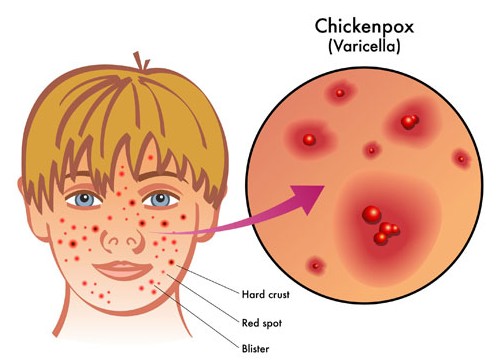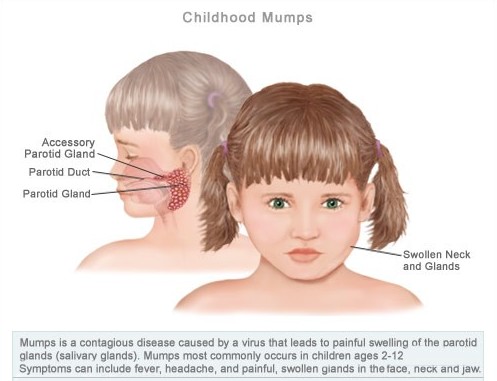Viral Infections and Children
Reprinted from Natures Field by Margo Walker
[Chickenpox, Measles, Mumps]
Chicken pox, measles, and mumps are acute, infectious diseases of childhood
which, although uncomfortable, rarely develop into serious illnesses.
It is generally good for parents to be familiar with the symptoms of
these viral infections and know of their potential complications. There
are many remedies which will relieve symptoms of these childhood diseases.
 CHICKENPOX
CHICKENPOX
Chickenpox, known as varicella, is a benign,
highly contagious illness
which can occur at any age although it is most common in children. It
is spread by contact with an infected person, and has an incubation
period of 10-14 days. This is the same virus which can also cause shingles,
Symptoms include fever, rash (blisters which turn into scabs), and fatigue.
In the early stages, your child may seem irritable and have symptoms
of a cold (runny nose and sneezing). The first spots can appear anywhere
on arms or face, but the chest and stomach are especially common. Spots
appear as soft red mounds about three millimeters across with watery
blisters in the center.
Usually they itch. Often there are just a few spots in the beginning,
then more appear after the first day or two.
In severe cases, the entire body can be covered with the hot, itchy,
red mounds. Many times the child will become feverish and distressed.
The urge to scratch is strong, but even if the spots are scratched they
continue to itch. This stage of the disease may last over a week and
can be accompanied by a cough. Gradually symptoms will subside.
Normally there are no side effects or further complications unless the
spots are badly scratched and become infected.
Pock mark scars may
remain for many years. The body will have lifetime immunity after an
attack of chickenpox. The severity of the attack can be reduced by following
some simple principles.
During the feverish stage, keep
the child quiet, preferably in bed.
Cotton gloves tied on the hands
will help prevent a baby from scratching the skin and leaving scars.
Cotton garments are most comfortable against the skin.
Rare complications of chickenpox include:
Pneumonia, encephalitis, hepatitis and nephritis. Chickenpox may be
fatal to children with immune deficiencies and those with leukemia or
other malignant diseases.
If your child has symptoms of any of these
complications or has a preexisting condition that causes him or her
to be more vulnerable to the virus,
consult a physician.
Treatment Dietary
Although the patient may not feel like eating solid foods, intake
of plenty of fluids is essential. Stress fruit and vegetable juices
rich in
vitamin C (orange,
grapefruit, lemon). A juice from fresh celery made in a blender
or juicer calms the nervous system.
When ready, introduce broths, soups, and solid steamed vegetables
and fresh fruit until the appetite is back to normal. See
this
file also.
Aromatherapy
Oil of
peppermint soothes
the rash: Add one drop of the oil to 1 quart of water; apply regularly
to blisters.
Aloe Vera can
stop itching and help to speed the healing process. Cut several
pieces of the plant and apply directly to the pox several times
daily. Apple cider vinegar diluted with a little water and applied
directly to the rash with a cotton cloth, or sprayed on will prevent
infection. Witch hazel painted on or diluted and sprayed will
speed the healing of the pox sores.
Hydrotherapy
Apply cool, wet towels to soothe the rash. Soaking in a lukewarm bath
to which a handful of uncooked oatmeal or soda has been added will relieve
discomfort before sleeping.
Orthodox
Doctors prescribe calamine lotion, dabbed on the rash whenever needed.
Acetaminophen is sometimes given to reduce fever. Aspirin is not recommended
because of the risk of Reyes syndrome.
 MEASLES
MEASLES
Measles come in two varieties: German, or three-day measles, known as
rubella, and ten-day measles, known as rubeola. Both of these disorders
are mild in infants and young children.
Rubella
is extremely dangerous to a fetus, especially during the first trimester.
Because of a vaccine in use since 1969, rubella is fairly uncommon in
childhood. Unfortunately, there are still many women who are not immunized
and did not contract the disease during childhood who are at risk.
Some children who have had an incomplete series of vaccinations or none
at all are also at risk for contracting and spreading rubella. Measles
generally require little medical attention. Often, the patient is restless
and irritable for some weeks prior to developing measles. The first
real signs of illness may be cold-like symptoms, followed by a rash
behind the ears, spreading over the body. The eyes are often red and
can be very sensitive to light.
The child may have a high fever and develop a cough.
Stomach pains, vomiting and diarrhea may also occur.
Rubella is highly
infectious and has an incubation period of 2-3 weeks. The patient should
rest in a well-ventilated room. Do not give warm drinks as they can
elevate the temperature.
Eyes should be shaded from the light, and watching television or reading
should be discouraged. Instead, spend time with the child, trying to
keep him calm. Your child should be examined by a health professional
if symptoms become severe or if the fever rises above 103 degrees or
is prolonged.
Treatment Dietary
While running a fever, give the patient plenty of fluids, including
fruit and vegetable juices. Once the temperature has returned to normal,
simple foods such as
vegetable soups are suggested.
Herbalism
Yarrow infusion helps
reduce the fever during the first stages of the illness. Pour
one cup of boiling water over two teaspoons of the dried herb
and infuse for 15 minutes; drink hot, three times daily. An
echinacea decoction will combat the virus, ease the symptoms of the rash
and clear mucus. Use it once the fever has started to come down;
put two teaspoons of the root in one cup of water and simmer for
15 minutes.
An infusion made of elderberry
blossoms is good to relieve the rash.
Chinese Medicine
The Chinese believe the body will detoxify as the rash comes out
by drinking teas made of
safflowers,
peppermint and honeysuckle.
Hydrotherapy
To soothe the rash, soak in a warm bath which includes three tablespoons
of baking soda.
Orthodox
Many doctors recommend immunization of children against the measles
virus. In the United States, proof of immunization is required before
a child can attend school. It is recommended that children be kept at home
while they have a rash and for another three days after the spots have
disappeared.

MUMPS
Known medically as parotitis, is a painful swelling of the salivary
glands. It is an extremely contagious virus, although it is generally a mild disease with rare side effects
in children. Because of the vaccine, licensed for use in 1967, mumps
is not as common as chicken pox and measles.
Symptoms of mumps include chills, headache, mild fever, muscular
pain in the neck, and pain and swelling in one or both of the parotid
glands located at the base of the jaw. The patient should be isolated
until the swelling diminishes. If you think your child has mumps, a
visit to a medical professional is suggested to confirm the diagnosis.
Antibiotics are not administered unless other complications develop.
Testicles may become inflamed and swell in young men. If the testicles
become inflamed, it could cause sterility.
Mumps will last a few days to one week. Difficulty in swallowing adds
to the discomfort of this disease.
Treatment Practical Advice
Children do not have to stay in bed unless
the fever is high. Staying warm and quiet is the suggested treatment.
They may be infectious to others until the swelling subsides.
Dietary
Light foods such as soups, juices, fruits and vegetables are advised.
Avoid dairy products, eggs, sugar
and red meat.
Drinking plenty of fluids is necessary.
Herbalism
1/4 teaspoon of poke root simmered in 1 cup of water for 10 minutes
when taken three times a day will relieve symptoms. Red
raspberry taken either in capsule form or as a tea is good
for viral childhood infections. Grated garlic or onion added to
warm vegetable oil when applied to a swollen neck is soothing.
Rubbing gums with a combination of one teaspoon of essential oil
of cloves and two teaspoons olive or vegetable oil is a powerful
topical anesthetic.
Orthodox
In male adolescents or men, corticosteroid drugs may be given to reduce
inflammation in the testes. A mumps vaccination is usually given in
combination with measles and rubella vaccines to children more than
one year of age.
Though some of these viruses common to children are preventable, if
your child should become ill, it is comforting to know they will usually
recover in a relatively short period of time with no permanent effects.
Meanwhile, making an effort to treat the symptoms will help you both
tolerate the illness with the least amount of discomfort, and hopefully
speed the recovery.
Sources:
The Complete Home Healer, by Angela Smyth (San Franciso,
California: Harper Collins Publishers, 1994).
American Folk Medicine, by Clarence Meyer (Glenwood, Illinois: Meyerbooks,
1985.
Natural Medicine for Children, by Julian Scott, Ph.D. (New York, New York:
Avon Books, 1990).
Natural Child Care, by Maribeth Riggs (New York, New York: Harmo-ny Books,
1989).
A Treasury of Natural First Aid Remedies From A to Z, by James Kusick
(West Nyack, New York: Parker Publishing Company, 1995).
Copyright 1999 by Robinson & Horne,L.C., P.O. Box 1028,
Roosevelt, UT 84066. This material may be duplicated for
educational purposes only (not for resale) provided it is not altered
in any way.



